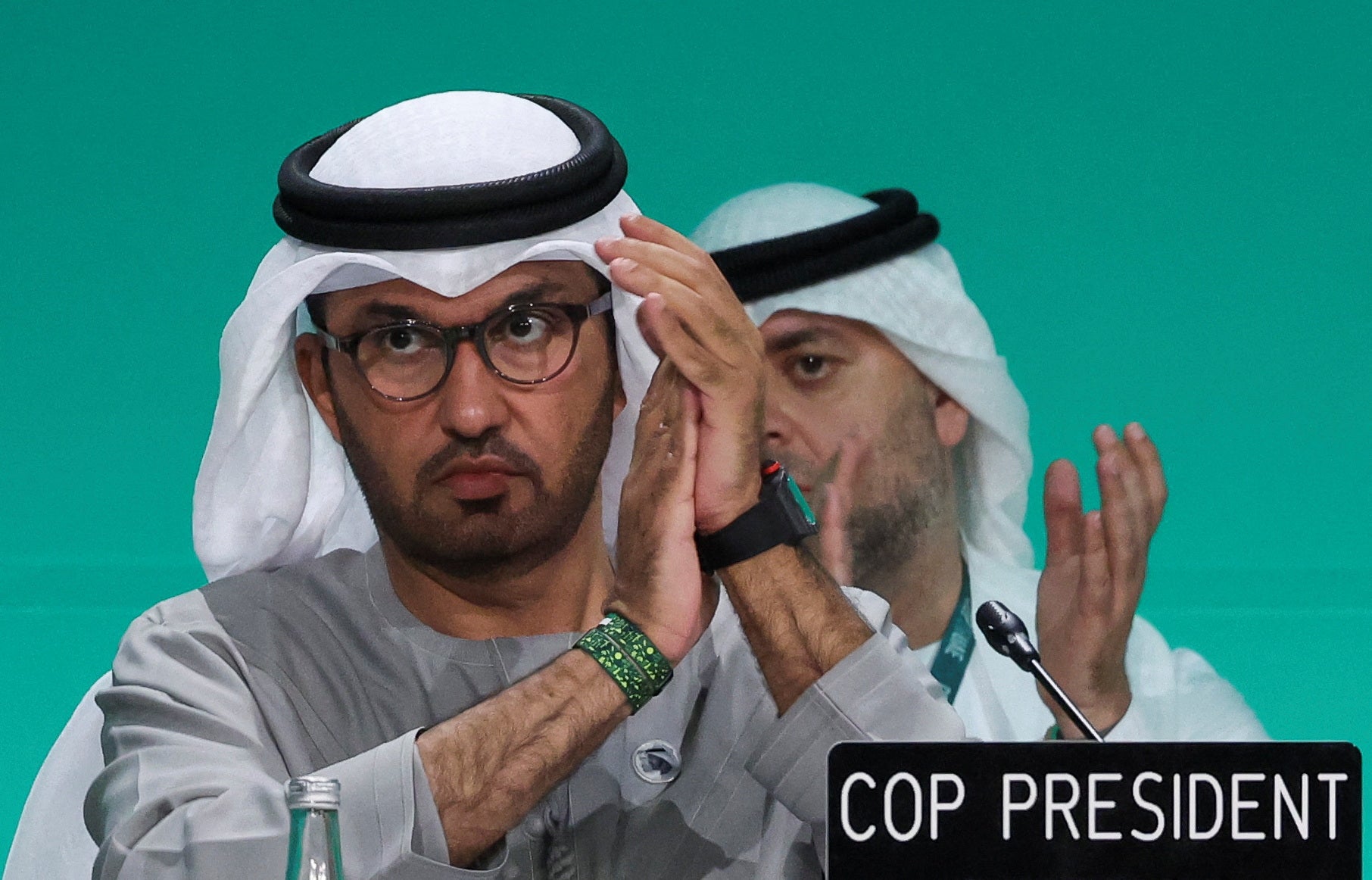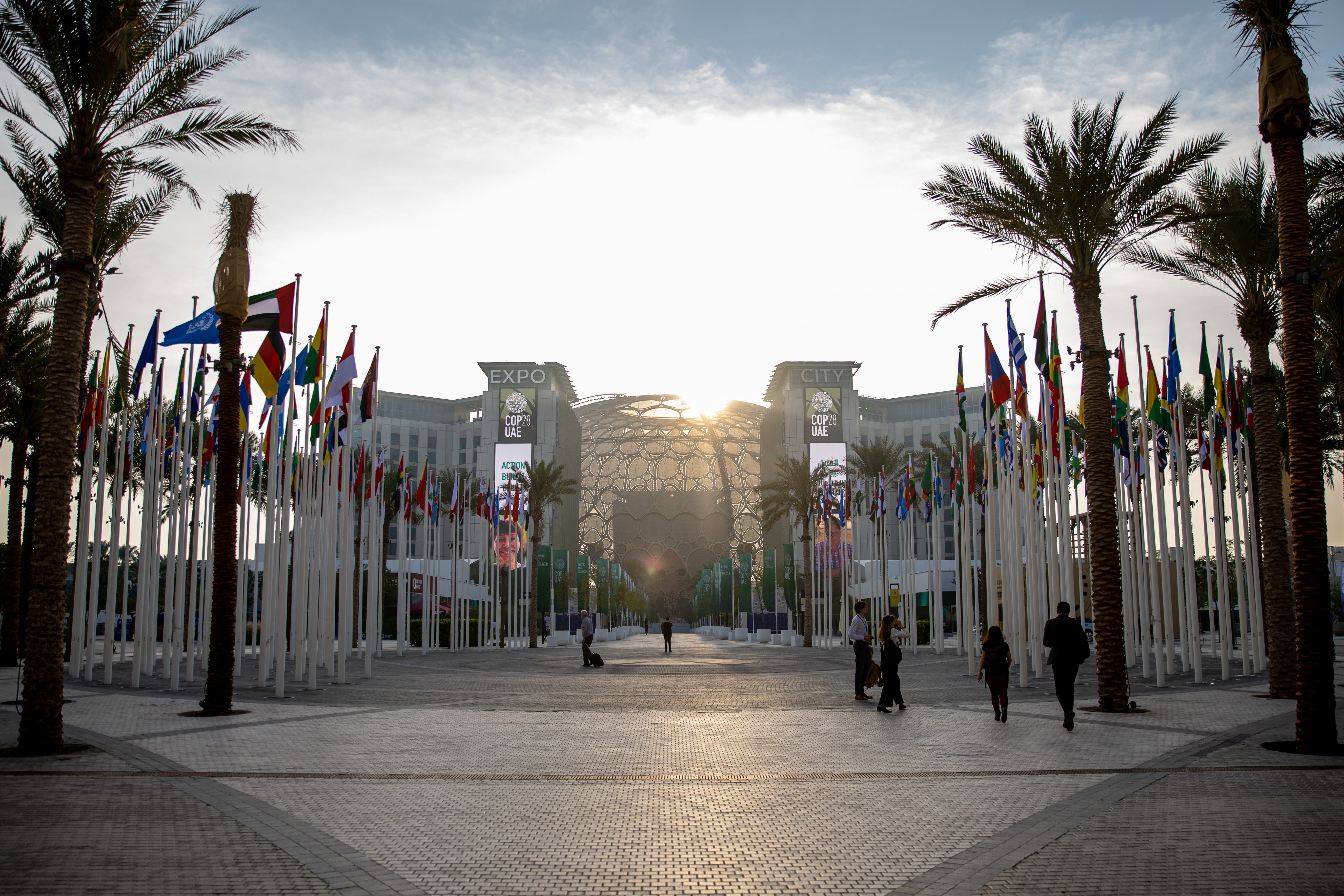Cop28: Five key takeaways from this year’s climate change summit
There were some historic moments in Dubai, but there is plenty of work still to be done
The curtain has fallen on the Cop28 climate summit, which ended with a historic deal calling for a “transition away” from fossil fuels.
After two weeks of talks, Cop28 president Sultan al-Jaber gavelled the final deal at 11am on Wednesday, exactly 24 hours after the official end of the summit.
The summit saw a fierce battle between countries that wanted language to include the “phase out” of fossil fuels and those against it, led by oil-producing nations such as Saudi Arabia. The deal was hailed by the United Nations as “the beginning of the end for the fossil fuel era”.
Here are some of the main takeaways from the summit:
An end for fossil fuels?
In three decades of climate negotiations, countries had previously failed to make any mention of the root cause of the climate crisis – the burning of fossil fuels which is driving emissions.
This time, it is finally there, as nations seek to keep the goal of limiting average global heating to 1.5C above pre-industrial levels within reach, with 2023 set to be the hottest year humans have ever experienced. There is also symbolism to it happening with a petrostate as host, the UAE.
“It’s embarrassing that it took 28 years but now we’re finally there. Now it finally seems like the world has acknowledged that we need to move away from fossil [fuels],” Dan Jørgensen, Denmark’s climate minister, said after the final deal was passed.
More than 130 countries, as well as scientists and climate activism groups had urged for the inclusion of an explicit commitment to phase out or even phase down use of fossil fuels.

“The deal is not perfect, but one thing is clear: the world is no longer denying our harmful addiction to fossil fuels,” the executive director of the UN Environment Programme, Inger Andersen.
While it is a big step forward, countries most vulnerable to the impact of the climate crisis, including rising sea levels and extreme weather say a lot more was needed.
“It is not enough for us to reference the science and then make agreements that ignore what the science is telling us we need to do,” Anne Rasmussen of Samoa, speaking on behalf of all small islands, told world leaders after the deal was agreed.
The UN’s climate chief, Simon Stiel said he saw this agreement as a “floor, not a ceiling,” calling for stronger targets in the future. That is the key. It is now up to nations to take the most ambitious interpretation of the statement to cut their emissions.
Corporate Cop28
There were a record number of attendees linked to the fossil fuel industry at the summit, some 2,456, according to an analysis by climate groups.
The Cop28 president, Sultan Ahmed al-Jaber, CEO of the Abu Dhabi National Oil Company, ran into a series of controversies before the summit and in its opening days. More than 130 legislators from the US and EU had called for his removal ahead of the talks, and then he had to say that he and the UAE “very much respect [climate] science” to quell a backlash over comments questioning the need to phase out fossil fuels.
During an online event in November, Mr Jaber suggested there was “no science” behind requiring the end of fossil fuels in order to limit temperature rise to 1.5C, a key aim in the fight against the climate crisis.
However, Mr Jaber led the climate summit to its conclusion.
“We will be leaving Dubai with our heads held high,” he told the final conference after passing the deal.

States such as Saudi Arabia pushed to include language about carbon capture and utilisation and storage (CCUS) into the final agreement, allowing fossil fuel production to continue and emissions being trapped and buried. However, climate groups have called such technology “dangerous distractions” to the goal of reducing emissions, with many envisioning a limited role for a CCUS at the speed reductions are required – given its expense and the fact that it is far from the scale needed.
Another fund without enough money
The Cop28 summit kicked off by putting into action what Cop27 put on paper, the loss and damage fund, aimed at helping poorer nations cope with the impact of the climate crisis.
At the start of the summit, Mr Jaber said he did not just want to set up the fund but for nations to fill it. Countries made pledges during the two weeks of talks, putting $790m (£630m) has been raised for the fund, not even 1 per cent of what studies suggest is needed. With estimates of the cost ranging from $100bn to more than $400bn (£319bn) a year.
Getting richer nations – some of the world’s largest polluters – to pledge such funds has been one of the biggest challenges in recent years.
The decision to move away from fossil fuels also points in one clear direction: developing countries, which have very little to do with this crisis, need money to transition to renewables.
“Adaptation is really a life and death issue,” said Bangladesh climate envoy Saber Hossain Chowdhury. “We cannot compromise on adaptation. We cannot compromise on lives and livelihoods.”

Six countries pledged new funding to the Green Climate Fund (GCF), established to help developing nations. Australia, Estonia, Italy, Portugal, Switzerland and the US put in $3.5bn. Another $188m was also pledged to the Adaptation Fund.
But the coffers remain low. A recent UN report said finance for adaptation needed to reach $194bn-$366bn a year.
Renewables on the rise
The summit has made one thing clear - renewables are the future and they are set to become the primary sources of energy in the coming decades.
The final deal called for countries to triple their renewable energy capacity by 2030.
Solar and wind energy use and infrastructure has already been expanding at rapid speed and prices have dropped.
Cop28 has sent a clear signal to the markets that renewables are the future and more investments will be made in the sector.
While this is a progress lauded by many, climate groups also said the language on renewables should be strengthened at future summits.
Another deal reached – on who will host Cop29
One of the issues looming over this year’s conference was where the next conference would take place.
Generally host countries know a year or two in advance when they are holding a summit of the scale of COPs. But this year, a geopolitical gridlock left the conference without a successor.
It was supposed to be Europe’s turn in 2024, but Russia vowed to veto any country’s bid to host the summit as most of the continent has lined up to condemn Moscow’s near two-year invasion of Ukraine.
Finally, on Saturday, just three days before the official end of Cop28, this gridlock was broken and Azerbaijan, another oil producer, was officially selected as the next host.
However, soon after the decision was announced, climate groups pointed to concerns over Baku’s human rights record. Both the UAE and Cop27 host Egypt faced similar questions.
“Yet another authoritarian, undemocratic oil state running Cop,” Christian Kroll, CEO of green search engine Ecosia, commented after the decision was finalised.
It’s now up to Azerbaijan to take climate action forward in 2024.
Join our commenting forum
Join thought-provoking conversations, follow other Independent readers and see their replies
Comments
Bookmark popover
Removed from bookmarks